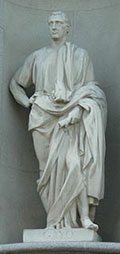treatises that are credited to him. What is known about
him, from the best of historians research, is that he lived during the years
130 to 180 A.D., during the reigns of the Roman emperors Hadrian, Antonius
Pius, Marcus Aurelius, and Commodus.
Although Gaius wrote several individual treatises on Roman
law, he is best known for his Institutes, which provide a comprehensive
survey of Roman private law. The Institutes are divided into four books,
dealing respectively with status of persons and their differences, status of
things or inanimate objects and rights relating to them, intestate succession
and obligations, and the existence and forms of causes of actions.
Why is Gaius so well regarded when so little is known about
him? First, his Institutes were selected by one later Roman emperor,
Theodosius II (401-450 A.D. ) to be included in his Law Code (438 A.D.). Gaius’
writings were also selected by that Emperor to serve as precedent for Roman
judges in rendering decisions in specific cases.That status, however, is not
the real reason for his historical importance as a “Great Jurist.” The reason
is that , some 350 years after his Institutes were written, they were
included almost word for word into the Emperor Justinian’s great work, Corpus
Juris Civilis (529-533 A.D.) This legal treasure became the basis for
almost all of the civil law systems of Europe, South America and other places
in the world. It is still used in many of modern legal systems in modern times.
Corpus Jurist Civilis, and with it Gaius’ Institutes, also became the basis for
the development of international law.
Providing the basis for so many legal systems and as one of
the foundations for international law, makes Gaius worthy of inclusion in Great
Jurists of the World.

 International
Judicial Monitor
International
Judicial Monitor